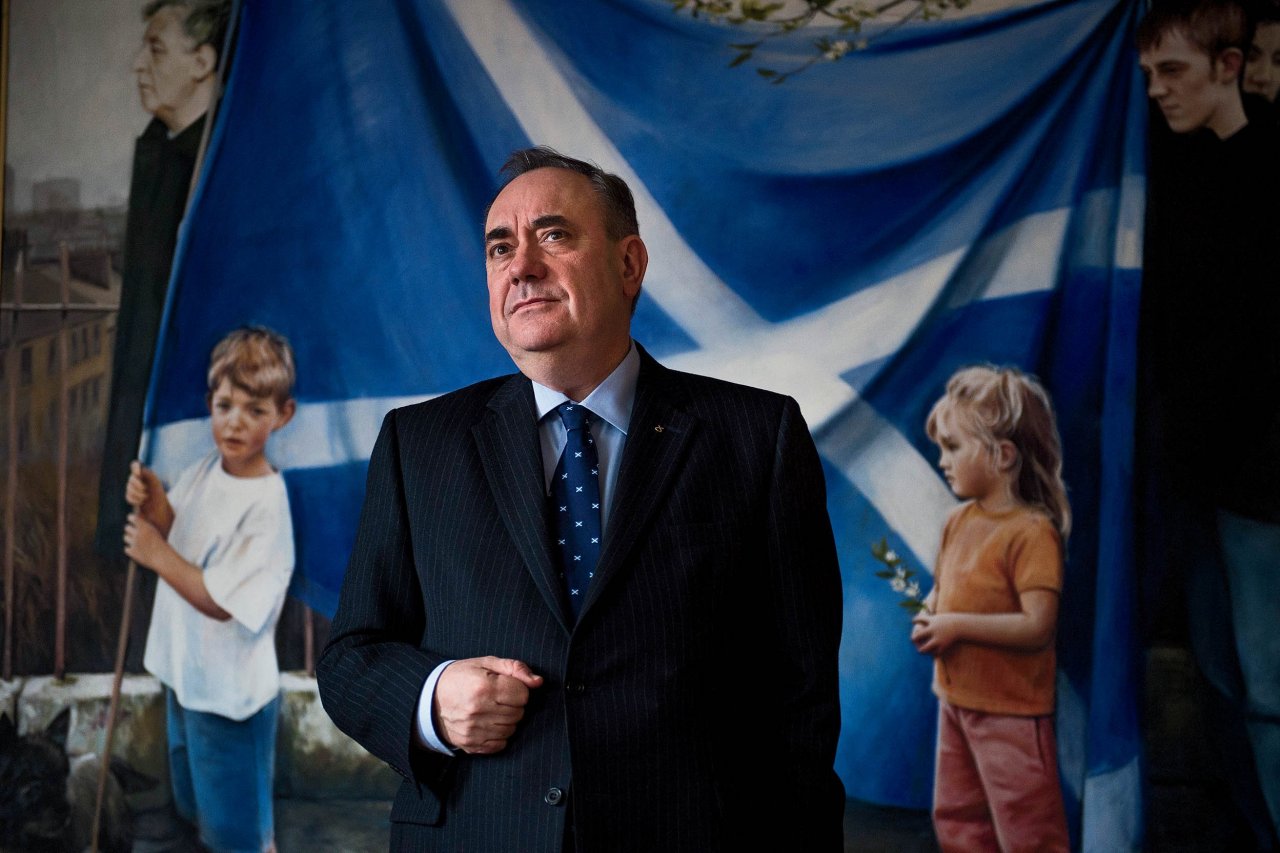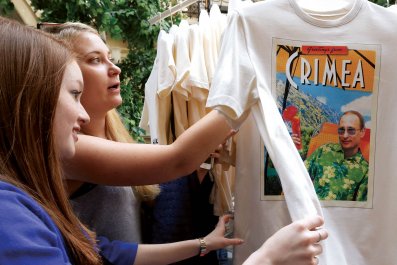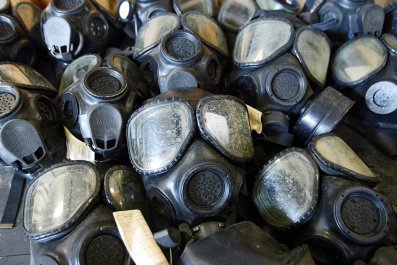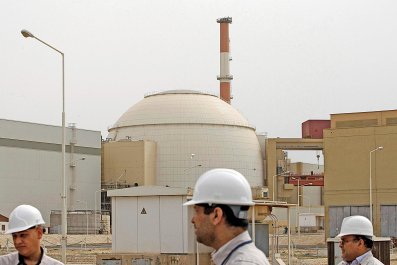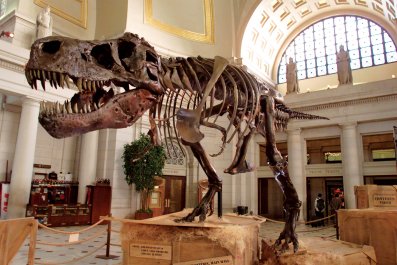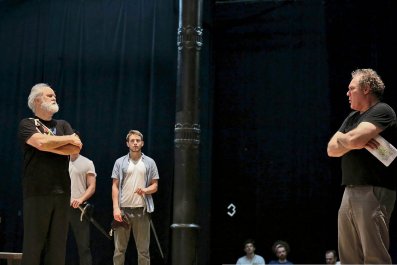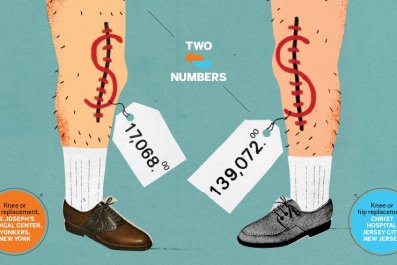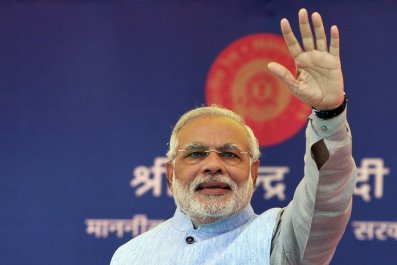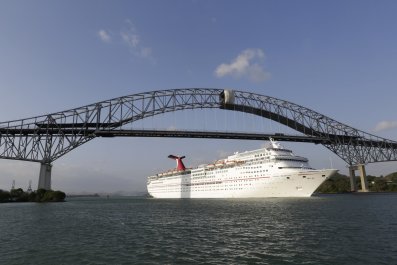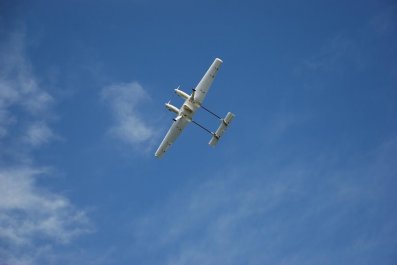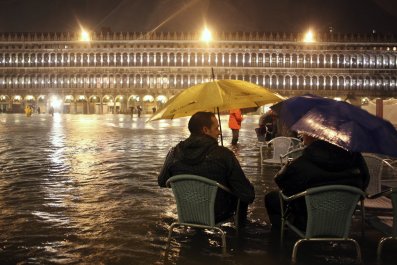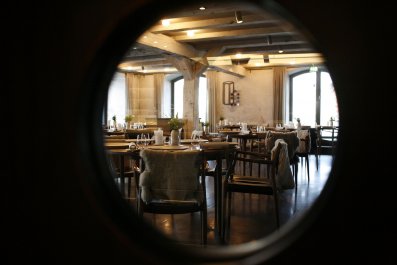In less than 100 days, the Scots will vote on whether to remain in the United Kingdom. Four million voters will be asked whether they want to separate from the Union.
The Scots are split down the middle, but only those living in Scotland get to make the decision. Jim, born in south Edinburgh in 1940, has twin sons voting yes and another son with a job and family in London, who, like the rest of the Scottish diaspora living in other parts of the U.K., will have no voice in the September 18 referendum.
Jim is typical. He is undecided, equally irritated by the Conservative government in London's Westminster and the Scottish National Party (SNP) government in Scotland. "I've been annoyed at the manner of [George] Osborne and the rest [of the U.K. government] telling us what we can and can't have," he says. Osborne, the Conservative chancellor of the exchequer, has said that Scotland would not be allowed to use the pound sterling if it were to separate from Britain.
In Edinburgh, home to Scotland's financial services sector, Osborne's message is powerful but also resented. His "no pound" announcement boosted the yes vote in the polls. While those backing the status quo stress the downside of separation, in this topsy-turvy campaign it is Alex Salmond, the wily leader of the Scottish Nationalists and first minister of Scotland's parliament, who is at pains to promise continuity and stability. "Scotland will not be a foreign country," he has said.
The yes campaign tries to reassure Scots that an independent Scotland would keep the royal family, the pound and the BBC. The no campaign, meanwhile, warns of irrevocable disaster, saying that the Scots won't be able to share the British currency and that a homegrown public broadcaster—the Scottish Broadcasting Co.—would be smaller, poorer and more expensive than the BBC. These threats, the SNP claims, are "bluffs and bluster" from an establishment in panic.
"Above all, [the yes advocates] want to reassure and say there will be no great rupture, just a seamless transition," explains Guy Lodge, a constitution expert at the Institute for Public Policy Research think tank and co-author of Scotland's Choices. And yes volunteers make sure they argue this point. "The path gradually diverges," says Fraser, a youth worker in his 30s. "We're not about to float off somewhere else!"
Others are less sanguine, pointing out that no one quite knows how separation would be managed or whether it would work to the benefit of the Scots.
"The future is not my period," quips professor Sir Tom Devine, Edinburgh University's foremost expert on Scottish history. He stresses the enormity of the challenge that would face a constitutional convention following a yes victory. Would Scottish negotiators be able to ensure favorable deals on trade, defense, security and myriad other areas of contention with the rest of the U.K., let alone NATO and the European Union? "We know a yes vote would be necessary first. But who knows then what all the variables would be?" says Devine.
What might follow—what will follow, claims George Robertson, former secretary-general of NATO—is the balkanization of the U.K. and its neighbors. "The fragmentation of Europe, starting on the centenary of the outbreak of the First World War, would be both an irony and a tragedy with incalculable consequences," he says.
Ben Page of pollster Ipsos MORI agrees that the path to independence will not be easy. ''We are sleepwalking into a potential disaster," he warns.
Despite its early and continuing lead in the polls, the no campaign has seemed the less confident of the two efforts, struggling to combat the passion of committed nationalists with pragmatic arguments in favor of maintaining the status quo.
Scottish Labour volunteers are looking forward to the party's big names coming out in the final weeks of the campaign. Former U.K. prime minister and fellow Scot Gordon Brown is rumored to be preparing to barnstorm across Scotland. He believes the promise of a more devolved government for the Scots will clinch the argument.
"Even before a vote has been cast in September's referendum, Scotland has already changed Britain forever," he wrote in The Guardian. "The Scots have already sunk without trace the old idea of Britain as a unitary state."
Devine believes the arrival of the devolved Scots parliament has changed the British political landscape forever. "You could say the Union itself changed in 1999," he muses, citing the date Tony Blair's Labour government established a parliament with limited powers at Holyrood in Edinburgh following a referendum in 1997. Since then, the Scottish executive has decided most domestic issues, including Scotland's separate health, education, university and justice systems.
Having so much of Scotland's policy decided there in the past 15 years has been, Devine believes, "reinforcing the development of a greater sense of self-worth, of self-confidence." He says, "It will never be the same again after this. The intensity of the political debate, between families, in the coffeehouses, has been quite remarkable.
"Unionism in the classic sense is now dead," he says, and what he calls "the muscular spine of a Scottish national identity" has provided the strength to deal it the fatal blow.
The main U.K. political parties have united to promise greater autonomy to Scotland, including a pledge by the Conservatives to give Holyrood full control over the income tax. Some parts of the welfare state could also be handed over. And within one month of a no vote, the anti-breakaway parties will meet and thrash out this expanded devolution, they promise.
"Independence and the status quo are both supported by a minority of Scots," says Lodge. "But giving Scotland more powers is popular."
The Economist believes politicians are "stretching the kingdom into a radically new shape" in their desire to tempt the Scots to stay. And other parts of the U.K. will also want more self-government. "The momentum is all towards devolution," says Martin Kettle of The Guardian. "And perhaps federalism."
Lodge thinks there will also be more powers for the Welsh Assembly in Cardiff and the Stormont government in Northern Ireland. Slowly, it will become necessary to overhaul how the Houses of Parliament in Westminster determine U.K. laws.
And what about England, where the idea of a national English identity may be on the rise? "The English have always been the dominant members of the Union and were not traditionally worried about devolution," says Lodge. "But over time that has changed. Now there is devolution momentum everywhere."
Malcolm Offord, a wealthy Conservative fund manager from Glasgow, believes the English, particularly in northern and Midlands cities, should demand their own new settlement. "The industrial working classes should say to the Scots, Thank you for agitating on our behalf. We don't want to be bullied by Westminster either. Why not have a parliament at York?" he muses. "Why not have Westminster dealing just with the genuine U.K. issues, like defense?"
Some mechanism will certainly be needed to tackle the anomaly in the House of Commons that allows Scottish members of parliament to vote on matters that affect only England or Wales when there is no reciprocal influence over policy in Scotland. This "West Lothian question"—named after the arch-anti-devolutionist Labour MP Tam Dalyell's constituency—will become more pressing after September's vote.
More powers for Scotland are inevitable, all the unionist parties agree. But what is the end point of home rule? Pro-independence voices use devolution to argue that voters should now finish the job.
"The constitutional tinkering of the past 20 years has been a disaster," says James Forsyth of the conservative Spectator magazine. "Devolution has not killed nationalism in Scotland, as its architects imagined, but led to a referendum on independence." Fears abound that even a narrow victory for the no campaign could result in a "neverendum": continuous wrangling and repeated demands for more plebiscites.
As the vote looms, Scotland's referendum seems less an abstract constitutional curiosity affecting only Scots and more like a failure to combat disillusionment with politicians. As Brown puts it, "Westminster's claim to have undivided authority over the country? Dead and buried."
Scottish independence terrifies governments across Europe. When addressing the U.N. General Assembly in April, Robertson says he witnessed a wave of international anxiety. "The majority see the breakup of Britain as being a profoundly destabilizing move in a fragile world."
Almost every state in the EU, as it slowly moves toward European integration, has secessionists, and these countries would be reluctant to welcome an independent Scotland back into the EU, for fear of encouraging a general splintering across the continent.
When Kosovo seceded from Serbia after the NATO military campaign against Slobodan Milosevic in 1999, several European countries refused—and still refuse—to recognize the republic. They fear each example of a successful breakaway encourages their own separatist movements.
Spain's government, for example, worries that Scotland's referendum is giving impetus to the separatist ambitions of Catalonia, the prosperous region centered around Barcelona. And while Spain's Basque separatists may have suspended their terrorist campaign, more than half the votes in the 2012 Spanish regional elections went to separatist or nationalist parties. Basques and Catalans inside the French border are also agitating for independence. And Corsica, too, has a long history of wanting independence from France.
In Belgium, activists who want Flanders to separate from Wallonia threaten the integrity of Belgium and have been boosted by recent elections. Italy's Northern League flourishes on the resentment of the more affluent regions in the country's north, which are angry about being yoked to the poorer and more corrupt south.
So how the Scots vote is not just a local affair; it is important for the cohesion of Europe. Should the Scots opt for independence, many governments fear their own separatist movements will demand a similar road to secession. That is what the droll Dalyell used to call "a motorway with no exit."
Correction: An edited version of this article stated that the referendum to establish the Scottish parliament took place in 1999. It in fact took place in 1997, and the Scottish parliament opened in 1999. It also referred to a 2012 Spanish general election instead of regional elections.



